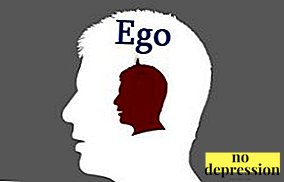Dementia most often develops. in old and old age.
Therefore, those who care about the elderly, it is important to know the symptoms and treatment of senile marasmus: it will help them in time to notice the manifestations of the disease.
Eliminating dementia is not always possible., but the sooner the treatment begins, the easier it will be to maintain the patient’s intelligence at the proper level.
What it is?

What does insanity mean and who is senile? As a person grows older, his body wears out, and towards old age, most people there is a list of diagnosesseriously affecting their lives.
The activity of the brain in the elderly and senile age is also disturbed: atherosclerosis and hypertension are negative affect the condition of blood vessels, which causes chronic oxygen starvation of both the brain and other organs.
Senility - an expression common among the general population. But the diagnosis with such a name does not exist.
Usually senile dementia is meant as senile marasmus. Older people with this disease are often referred to as senile, but this is also not a medical term.
Senile (or, in other words, senile) dementia - a form of dementia that develops after sixty years under the influence of one or several unfavorable factors.
It is characterized by the following the signs: deterioration of cognitive abilities, loss of previously acquired skills and knowledge, impaired ability to acquire new skills and assimilate information.
The severity of symptoms depends on the severity of the disease. The likelihood of developing dementia increases after 65-70 years: at least 15% of people over this age have a mild form of senile dementia, and about 5% have a severe form and need continuous care.

The number of people with senile insanity will increase significantly in the coming decades.
It's connected with improving the standard of living of the population: more people will be able to live to old and old age.
Reduce the likelihood development of dementia is possible, but it is important to begin to comply with preventive recommendations long before the age period at which the risk of occurrence is highest.
It is necessary to control diseases that can adversely affect the functioning of the brain, and regularly give yourself an intellectual burden.
Causes of senile dementia
The main causes of senility in men and women:
- Alzheimer's disease. The main part (over 50%) of cases of senile dementia is associated with this disease. Almost always Alzheimer's syndrome develops in the elderly or old age, and the older the person, the higher the likelihood of this pathology. The cognitive abilities of patients suffering from this disease gradually weaken, they cease to understand what is happening around them, they lose the ability to speak and perceive speech, their actions become illogical. As the syndrome progresses, patients completely lose their ability to take care of themselves, stop moving and need continuous care. Death occurs due to pathological conditions associated with the inability of patients to move (pressure sores, congestive pneumonia). The majority of patients die in the first five to seven years after diagnosis.
- Vascular diseases. Dementia in about 10–20% of patients is associated with vascular disorders, such as atherosclerosis, arterial hypertension, cardiovascular insufficiency, consequences of hemorrhagic or ischemic stroke. And with hypertension, and with atherosclerosis, and with CLS, the blood supply to the brain is disturbed. If there is no stroke of any origin, the cognitive impairment characteristic of dementia will progress gradually, and others may not notice for a long time changes in the patient's condition.
- Benign and malignant tumors in the brain tissue. Much depends on the location and characteristics of the tumor or cyst. If the tumor mass does not increase and is small, its presence in the brain may not be accompanied by any pronounced symptoms.
Large tumors can lead not only to dementia, but also to many other complications.
- The consequences of traumatic brain injury. Serious traumatic injuries lead to the death of a part of the brain or to a noticeable dysfunction. Slight injuries rarely cause dementia.
- Pronounced lack of nutrients. The development of dementia is caused by the deficiency of vitamins of group B, in particular thiamine (B1), nicotinic acid (B3), folic acid (B9), vitamin B12. Moreover, vitamin B12 deficiency is often the cause of the development of depressive states in the elderly.
- Long-term alcohol addiction. The prolonged use of alcoholic beverages in large quantities leads to the development of chronic intoxication, which leads to the appearance of symptoms of dementia.


Also disease able to develop against the backdrop of AIDS, neurosyphilis, endocrine pathologies, renal and hepatic failure, some autoimmune diseases, Pick's disease.
As a rule, senile dementia develops either against the background of Alzheimer's syndrome, or due to vascular pathologies, or a combination of both disorders. Rest negative factors are aggravating.
Symptomatology
The symptoms inherent in senile dementia, and their severity may vary, depending on the severity of the disease. There are three degrees of dementia:
- Easy. The patient is able to serve himself and perform simple actions, is aware of the reality surrounding him and tries to compensate for the symptoms (keeps records, trusts the assertions of relatives and doctors), experiences various difficulties when using cognitive abilities. It is more difficult for him to memorize and reproduce information, to get new knowledge, to recognize people by sight.
He practically doesn’t need control and support, but he is able to get lost somewhere, because of his pathology, it is more difficult for him to navigate in space.
- Average. The patient is irritable, his actions and judgments look illogical, there may be delusions. Speech becomes simplified, vocabulary is reduced, speech errors occur (for example, the patient is able to use the wrong word instead of the forgotten one). Patients can take rash, unreasonable actions (running away from home, misusing a gas stove, using hazardous substances by mistake) and therefore need to be monitored and supported.
- Heavy. The intellect is significantly reduced, patients practically lose their ability to serve themselves, lose their motor skills and as a result almost cease to move. Speech gradually disappears, and over time, the patients stop talking.

The severity of symptoms in dementia of vascular genesis is not as significant as in Alzheimer's syndrome.
The main symptoms of senility in the elderly:
- Cognitive impairment. With dementia of vascular origin, disorders in the process of memorizing and reproducing information come to the fore, other cognitive functions suffer less. Alzheimer's syndrome affects all cognitive skills (speech, memory, thinking, attention, the ability to navigate in space, and so on).
- Delusions. Rarely observed in the early stages of the disease. The patient begins to make delusional claims, report his own fears (something happens, someone steals something), is able to show aggression or be offended if others try to convince him. Can blame others (they add something to his food, they want to take his property).
- Apathetic. Interest in cognitive activity is gradually extinguished, motivation disappears in patients.
- Aggressiveness, irritability, changes in behavior and mood. People with dementia often experience dramatic changes in mood, and they can flare up under any circumstances, even the most innocent.
Other patients may be, on the contrary, tearful, overly sentimental.
- Depression and other mental disorders. Many patients have depressive symptoms (hopelessness, apathy, loss of motivation, a feeling that there will be nothing good in the future). In some cases, hallucinations may occur.
- Somatic symptoms. The occurrence of frequent headaches, sleep disturbances (insomnia, daytime sleepiness, and superficial sleep) is characteristic.

The set and severity of symptoms depends on the characteristics of the disease.
Friends and relatives of the elderly important to notice changes in cognitive abilities (forgetfulness, distraction, reduced interest in what was important earlier, light speech disorders) and, if necessary, insist on conducting surveys.
What looks like a normal age deviation can be a serious pathology.
Diagnostics
Diagnosis is subject to availability complex characteristic of dementia symptoms, which is called "three A"):
- aphasia (problems with speech);
- agnosia (violations of perception, difficulties in recognizing faces, words);
- apraxia (difficulty in committing successive actions).
Additional examinations are also shown: computer and magnetic resonance imaging.
Diagnosis of dementia involved a psychiatrist and a neurologist.
Treatment
How to treat? Features of treatment largely depend on the disease or pathological condition, on the background of which there are signs of dementia, and on what additional diseases are present in the patient.
Features of treatment of dementia with:
- Vascular diseases. The therapy is based on improving blood circulation in the brain and controlling vascular diseases that cause dementia symptoms. Prescribed drugs that normalize blood pressure (selected depending on the severity of hypertension; examples: Lisinopril, Nifedipine), improve blood circulation and increase interest in cognitive activity (nootropa: Piracetam), neurotrophic (Cerebrolysin). Medications that can adversely affect the patient's intelligence are prescribed with caution.
- Alzheimer's Syndrome. This disease will steadily progress, and you need to come to terms with it. The patient is prescribed palliative care drugs (those that can improve his quality of life and have a positive effect on cognitive functions). Reception of memantine and anticholinesterase drugs (Armin, Phosphacol) is shown.

On the health of patients has a positive effect psychotherapy. Also, as a rule, they should abide by specially selected diet.
Treatment of any type of dementia should always be under the control of doctors. At home, it is impossible to cure the patient, so if you see signs of illness, you must go to the hospital.
The doctor supervising the treatment process will give the relatives care recommendations to which important to listen. The more attentive and more careful the relatives will treat the patient and the more carefully they follow medical advice, the longer he will live and the more comfortable his life will be.
Before using any popular recipes, you should consult with your doctor.
It is also helpful for relatives to read more. information on how to care for sedentary and immobile people, purchase equipment that will help the patient to feel good (handrails, non-slip mats and special seats for the bathroom, medical bed, massagers, wheelchair).
The expediency of a particular purchase is important to discuss with your doctor.
What do relatives do?
Tips for your friends:
- Be patient. Old age inevitably brings with it diseases, and many of them can seriously affect the psyche and intellect of a loved one. If the patient behaves inadequately, cannot understand what you explain to him, it is important to try to maintain composure: all these difficulties are symptoms of the disease, and your aggression will only aggravate his health.
- Carefully follow doctor's recommendations. Demented patients may forget to take medications, so you need to give them to them regularly. It is important to follow the diet, do exercises, accompany to the hospital and to a psychotherapist.
- Support the patient both emotionally and practically. Give advice, offer to keep notes, cheer, talk on various topics, give gifts, go for a walk.
Happiness and comfort of a loved one depend not only on the availability of medicines and equipment.
- Consult a psychotherapist if you feel a deterioration in your own well-being. Caring for a seriously ill person is an exhausting process, so at some point you may feel devastation, feel that your mood has not been good for a long time. You can help a qualified specialist.

Prognosis and prevention
How many people live with dementia and can it be avoided?
Prevention of dementia:
- Control of cardiovascular diseases. It is important to listen to the recommendations of doctors and regularly take prescribed medications. It is important for people with severe cardiovascular diseases to undergo repeated examinations in a timely manner.
- Quality food. In any age period it is necessary to eat a full and varied diet in order to avoid many health problems.
- Intellectual loading. According to studies, people who actively use two languages get dementia almost five years later than those who speak only one. It is important to learn about the world around us, to memorize, analyze, acquire new skills at any age.

The prognosis for dementia depends on the diseases against which it developed, and on the degree of neglect. If dementia is vascular, and its treatment started on time, to achieve good results or at least stabilize the state more than real.
Alzheimer's disease is incurable and will gradually progress. Most people with this pathology die within the first seven years.
A clinical psychologist will talk about the difference in diseases between dementia and pseudo dementia:



